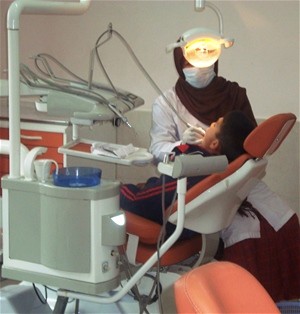
A dentist at Kabul Medical University’s Dentistry Teaching Clinic treats a young patient in the pediatrics department.
USAID/AIRP
USAID supports energy programs that improve instruction and delivery of dental care.
23 JUNE 2010 | KABUL, AFGHANISTAN
In Afghanistan, electricity is ensuring better lives and brighter smiles. When it opened in March 2007, the Kabul Medical University Dentistry Teaching Clinic was stocked with state-of-the art lab equipment, but faced a major problem: Electricity, needed to power lights and machinery, was scarce and unreliable.
“It was a problem for teaching,” said Dr. Shakib Sobat, a doctor of dental surgery. “Computers, projectors, and machines all stopped when there was no power.” Patient care was also compromised by the lack of power.
All of that changed in early 2009 when reliable electricity began to flow into Kabul with the assistance of the U.S. Government. USAID’s Afghanistan Infrastructure and Rehabilitation Program introduced new power sources to Kabul, ensuring round-the-clock power in the capital city. The Government of the Islamic Republic of Afghanistan began to import more electricity from Uzbekistan, and the Tarakhil Power Plant came on line to serve customers connected to the power grid.
The clinic and its patients and students benefited. Dental surgery no longer required three back-up generators, and services were no longer restricted to daylight hours. Operating costs also dropped. In the past, the clinic depended on a generator that used large amounts of expensive diesel fuel. “We were using it all the time,” said the deputy dean of Kabul Medical University. “Now we don’t need it.”
Today, 500 students are enrolled in the seven-year dental program, including 24 women. Student interns, under the guidance of their professors, treat 80 to 90 patients per day in laboratories dedicated to dental specialties. Patients range in age from eight to 80.
USAID is committed to ensuring a sufficient and stable supply of electricity to all of Afghanistan. With affordable, reliable power, businesses can operate at full capacity, residents can heat their homes, and Afghan citizens can receive the medical care that they need. For those Afghans receiving quality dental care at the Dentistry Teaching Clinic, their healthier smiles are proof that increased electricity improves lives.







Comment
Make a general inquiry or suggest an improvement.